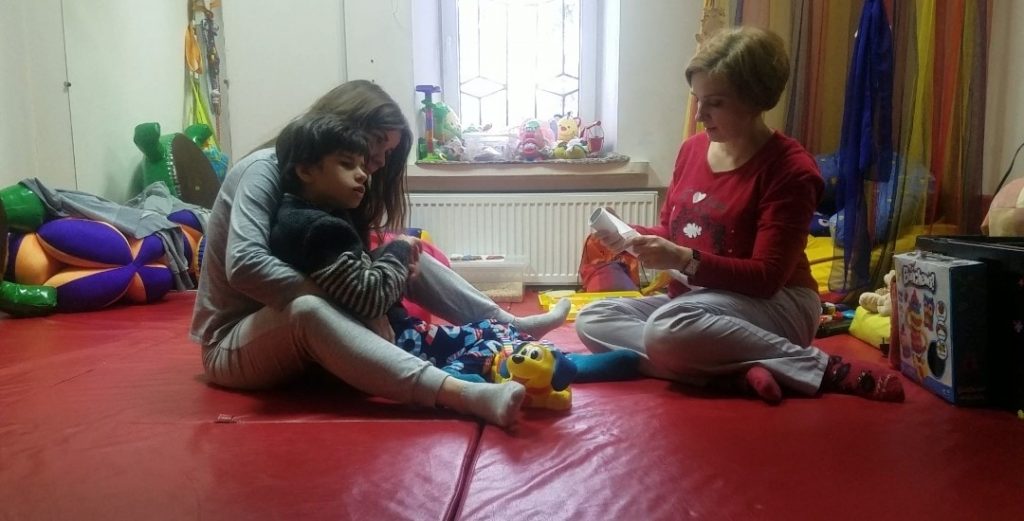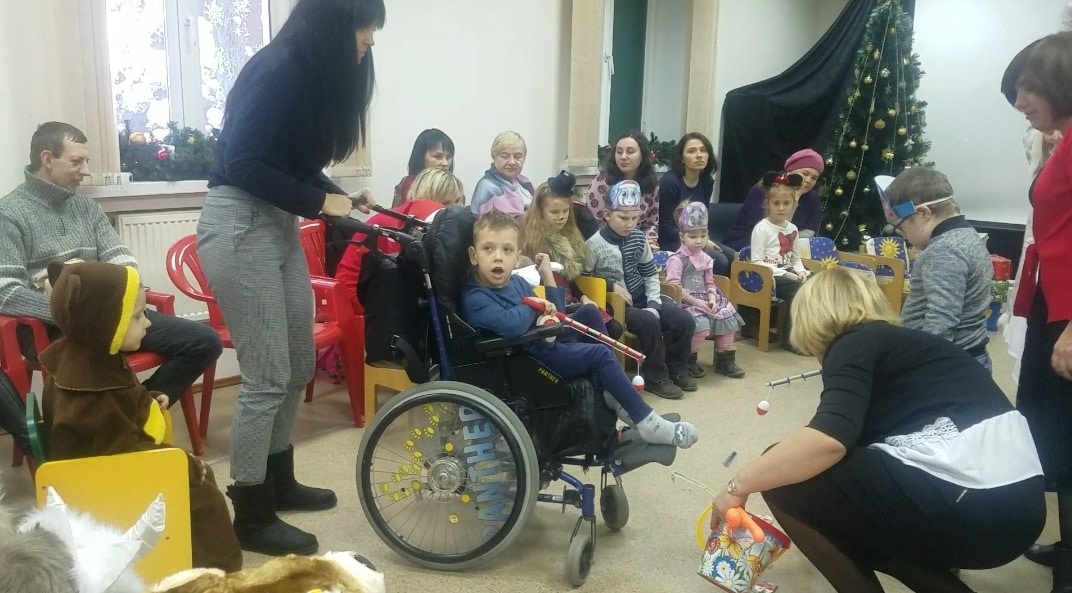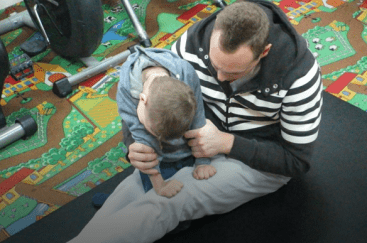Severely disabled Ukrainian children depend on American money
Disabled Ukrainian children depend on U.S. money

ZHYTOMYR, Ukraine – When Mission to Ukraine volunteers first started helping the disabled children at the Romaniv Orphanage 15 years ago, the first thing Executive Director Steve Boles noticed was the unmarked mounds behind the building. When Boles asked one of the employees what the mounds were, they casually replied that’s where the dead children’s bodies were buried. The death rate at the orphanage of about 80 severely disabled young men was one child every month, and the workers there treated them like untamed animals, Boles said.
When Mission to Ukraine volunteers came to help, the workers’ attitudes toward these men changed. Now each of those men buried have proper tombstones.
“Humanizing these men has been the biggest impact of something I’ve seen,” said Boles.
Volunteers and paid employees at Mission to Ukraine work each year with about 800 disabled children, in addition to those at Romaniv. The charity raises $1,280,000 a year and offers free occupational and physical therapy at its center in Zhytomyr, 87 miles west of Kyiv, according to its registration records. Tax records show 93 percent of the total expenses at Mission to Ukraine are used to fund program activities, like occupational and physical therapy treatment, while the other 7 percent is spent on expenses like administrative costs.
The Better Business Bureau’s accreditation standards require charities to distribute a minimum of 65 percent of the charity’s total expenses to program activities, so Mission to Ukraine exceeds standards.
Some families who donate to the charity are Ukrainian-American. The majority are Christians not connected to Ukraine who donate roughly $100 per month, said Boles. Indiana schools and churches organize collection boxes for small items, like diapers or stuffed animals. Audited tax records show cash donations from American families and small businesses total about 90 percent of the financial revenue at the nonprofit over the last 20 years.
“Ukraine is not a rich country and the families who have kids with disabilities do not always have the possibility to work at jobs that make enough money to afford this high quality of service,” volunteer Sasha Chaikovskyi said.
The annual salary in Zhytomyr is under $180 a month, according to a 2016 Ukrainian government report. The focus at Mission to Ukraine is not just helping children – they also provide these families with food and clothing.
A yearly spring gala is held to raise about $100,000 from the board members’ wealthier friends, said Boles.
Ukrainian Involvement
“When we started 20 years ago, we did not do much fundraising in Ukraine,” Valentyna Piskunova, financial director at Mission to Ukraine said. “But as Ukraine developed and our organization developed, we started learning ways to attract Ukrainian people to our charity and motivate them to support us financially.”
According to the nonprofit’s donation records, Ukrainian leaders such as former Prime Minister Hennadiy Zubko and Sergey Sukhomlin, chairman of the city executive committee, donated at least $250 worth of food or money to the nonprofit since 2017.
Despite receiving funding from Ukrainian politicians, the charity has a hard time raising money from middle-class Ukrainians, said communications director Tetiana Grasiuk.
In Zhytomyr, about 40 Ukrainian paid staff members annually hold two fundraisers to collect about $1000 for medical equipment. In 2011 the charity raised $2,000 to purchase a dental chair and in 2014 they raised $1,000 to buy an ultrasound.
“The staff members reached out to friends and families to donate about $5 to the fundraisers, and little by little we raised enough money,” said Grasiuk.
Mission to Ukraine has an employed committee to oversee and monitor donations. The committee looks at the annual budget guidelines to see what portion of the donations go towards families with disabled children.
The charity receives government-run medical inspections each year and in 2018 it received high marks, according to medical inspection reports.
Mission to Ukraine tries to avoid corruption by documenting internal reports each month that monitor possible issues. Mission to Ukraine also sends a monthly financial report that includes bank receipts and financial logs to the American Board of Directors. Ukrainian tax officials track which families receive care and services from Mission to Ukraine because it is a medical center.
“We try to have a brotherhood between the folks in Ukraine and the people in the United States, and it is my role to make sure the money from America shows up in Ukraine,” said Executive Director Steve Boles.
In the United States, there are three ways to ensure the money goes where it is assigned to go, said Boles. The first, is that the Board of Directors are not paid and the charity audits local finances, according to the audited tax records. The second, is that the nonprofit hires an outside organization to look at the financial receipts and file annual tax records; Mission to Ukraine uses the CapinCrouse LLP accounting firm. The third is the American donations are sent to a P.O. box, so checks are locked around the clock, said Boles.

Changing the “Post-Soviet” Attitude
Volunteer Sasha Chaikovskyi was originally one of the first disabled children who Mission to Ukraine has helped with providing free medical treatment.
One June morning in 1993, Chaikovskyi, then 3 years old, was playing with a bottle of kerosene. Moments later the bottle caught fire and by the time his grandmother came to rescue him, 60 percent of his body was covered in burns.
“The doctors at the time said I would not survive, but my parents were still fighting for my life,” Chaikovskyi said.
After hearing about Chaikovskyi’s story, an American volunteer at Mission to Ukraine decided the young charity needed to help Chaikovskyi receive more medical treatment.
The charity raised thousands of dollars and flew Chaikovskyi to the United States where American doctors treated his burns and arranged skin graft surgeries that would help increase the range of motion in his neck. Since then, Chaikovskyi has visited the United States four more times for surgeries that Mission to Ukraine leaders paid for.
“When citizens in Ukraine see people with disabilities, they laugh and point fingers,” said Chaikovskyi, who is now 28 years old and has been working for the charity for the past 14 years. “This happened to me as a kid and it was hard for me. I was always asking, why is this happening to me? Now I know it was part of this mission.”
Chaikovskyi said that children with disabilities in post-Soviet Union countries have often been abandoned by society. The nonprofit tries to transform the lives of these overlooked children by making them not feel ashamed of their disability.
“When you have a disability you always think that you are alone and that everyone else is fine,” said Chaikovskyi. “The fact that these kids can interact with others and learn that it is ok to be unique or special is really important.”
One example of children with disabilities having the opportunity to connect with other disabled children is during the week-long summer camps at the charity.
Tara Bender, an American volunteer during the summer of 2016 and 2018, acted as a personal camp counselor for a severely disabled orphan. At the camp she said orphans join 150 other disabled children in activities like blowing bubbles, arts and crafts, and Special Olympics-styled obstacle courses.
“Participating in these camps, playing games together, and eating great food is stuff they would not normally have access to,” said Bender.
During the rest of the year, the center provides sessions for children to receive school-readiness training.
In the past, kids were stuck in the apartment because their parents were embarrassed about taking them outside, said Boles. Now he sees that these children can receive physical therapy and go to school.
“We see ourselves as servants who want to give opportunities to other people and empower them and show the value they have,” Grasiuk said.
Bohdan Yarema, an education officer at UNICEF in Ukraine, said the system during the Soviet days would determine the future of the disabled person based on their diagnosis as a child.
“If you go back to the older Soviet days, in general, children were streamed into education and there was a panel that assessed the condition of the child and decided where that child should go and what level of education they should get,” said Yarema. “That changed when Ukraine gained independence.”
Alyona Livinska is a special education therapist at the charity who works with children who need preparation before or while attending public school. Livinska meets with a group of about a dozen students for 90 minutes twice a week, helping the children develop social skills they will use at school. She says the children must have time to develop their skills to become more independent with daily functions, like waiting in line with classmates or asking to use markers.
The sessions also teach parents that their disabled child can do simple tasks on their own, like tying their own shoes and dressing themselves.
Sometimes it is the parents who need training, said Livinska.
“There was a young boy named Vladik who came to Mission to Ukraine in pretty bad shape. He didn’t speak, he didn’t look people in the eye. He was living in his own world and not interacting with others,” said Livinska.
Sometimes Livinska lets the parents guide their children through class exercises so she can prove to them that their children are learning.

One day she took the class outside and had the parents teach their children about how the leaves on the trees change during the different seasons.
“The next day when the parents and children returned for lessons, I asked Vladik what he learned the previous day, and his mom was shocked that he remembered all of those things. She did not realize he could do it,” said Livinksa.
Livinska said that parents must accept their child with disabilities as they are and make them feel loved. As a therapist, Livinska said she sees this separation and creates exercises where the children and their parents work together, then hugs at the end as a reward which forces them to show affection towards their child.
Today Vladik is studying in a public school in an inclusion program where he has lessons in a classroom setting with people who do not have disabilities.
Some parents put the responsibility of their child on therapists and do not learn how to help their child. Livinksa said her biggest challenge is explaining to parents that their involvement is crucial, and they must work on helping their child too. She continues her work, despite these challenges, because she knows these families depend on Mission to Ukraine to receive this medical care.
“I want to help give these children with severe disabilities a life and not just exist,” said Mission to Ukraine therapist Alyona Livinska. “That they can live a full life that is worth living.”
Moving Forward
The current Mission to Ukraine facility in Ukraine includes a waiting area, some small offices, small therapy rooms, and a playground. It is cramped and both therapists and volunteers said the charity is quickly outgrowing the building.
“We are finding today, that after 20 years, the need is still greater than what we are able to help with and our biggest constraint is the facility,” said Ukraine-based Mission to Ukraine Director Ira Venglovska. “When we originally bought this place, we tried to accommodate and make it work but ultimately we have outgrown the space.”
Venglovska is one of the charity’s founders, according to Ukrainian registration documents. She said the charity is planning on spending $3.5 million on a new, larger rehabilitation center that will hopefully be built by 2021 so they can help the more than 6,000 children who have disabilities in the Zhytomyr region. Venglovska said the majority of the money the charity will raise to build the facility will be through private American donations.
Leaders from the charity visited properties for the past ten years, like former schools, when they were looking into places to relocate Mission to Ukraine. However, Venglovska said the architects helping them said the charity would spend more money trying to reconstruct the location into being handicap accessible and accessible to the disabled children’s needs compared to building one from the ground up.
“Right now, the country is moving in the right direction. It is not smooth, and it is not easy but at the same time, there are very successful cases and there are very sad cases,” said Grasiuk, “but the movement in general is very good.”
This project was produced with Anastasia Tymoshenko, a journalism student at the Kyiv-Mohyla Academy in Kyiv, Ukraine, who served as videographer, translator and local guide.





